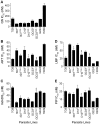Identification of a mutant PfCRT-mediated chloroquine tolerance phenotype in Plasmodium falciparum
- PMID: 20485514
- PMCID: PMC2869323
- DOI: 10.1371/journal.ppat.1000887
Identification of a mutant PfCRT-mediated chloroquine tolerance phenotype in Plasmodium falciparum
Abstract
Mutant forms of the Plasmodium falciparum transporter PfCRT constitute the key determinant of parasite resistance to chloroquine (CQ), the former first-line antimalarial, and are ubiquitous to infections that fail CQ treatment. However, treatment can often be successful in individuals harboring mutant pfcrt alleles, raising questions about the role of host immunity or pharmacokinetics vs. the parasite genetic background in contributing to treatment outcomes. To examine whether the parasite genetic background dictates the degree of mutant pfcrt-mediated CQ resistance, we replaced the wild type pfcrt allele in three CQ-sensitive strains with mutant pfcrt of the 7G8 allelic type prevalent in South America, the Oceanic region and India. Recombinant clones exhibited strain-dependent CQ responses that ranged from high-level resistance to an incremental shift that did not meet CQ resistance criteria. Nonetheless, even in the most susceptible clones, 7G8 mutant pfcrt enabled parasites to tolerate CQ pressure and recrudesce in vitro after treatment with high concentrations of CQ. 7G8 mutant pfcrt was found to significantly impact parasite responses to other antimalarials used in artemisinin-based combination therapies, in a strain-dependent manner. We also report clinical isolates from French Guiana that harbor mutant pfcrt, identical or related to the 7G8 haplotype, and manifest a CQ tolerance phenotype. One isolate, H209, harbored a novel PfCRT C350R mutation and demonstrated reduced quinine and artemisinin susceptibility. Our data: 1) suggest that high-level CQR is a complex biological process dependent on the presence of mutant pfcrt; 2) implicate a role for variant pfcrt alleles in modulating parasite susceptibility to other clinically important antimalarials; and 3) uncover the existence of a phenotype of CQ tolerance in some strains harboring mutant pfcrt.
Conflict of interest statement
The authors have declared that no competing interests exist.
Figures





References
-
- Wellems TE, Plowe CV. Chloroquine-resistant malaria. J Infect Dis. 2001;184:770–776. - PubMed
-
- Wongsrichanalai C, Pickard AL, Wernsdorfer WH, Meshnick SR. Epidemiology of drug-resistant malaria. Lancet Infect Dis. 2002;2:209–218. - PubMed
-
- Rieckmann KH. The chequered history of malaria control: are new and better tools the ultimate answer? Ann Trop Med Parasitol. 2006;100:647–662. - PubMed
Publication types
MeSH terms
Substances
Grants and funding
LinkOut - more resources
Full Text Sources
Other Literature Sources

